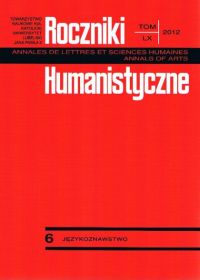Slavek i Slavko – nazwy maskotek Mistrzostw Europy w Piłce Nożnej 2012
Abstrakt
This paper focuses on the present and past pronunciation and spelling forms of the Polish and Ukrainian phonemes /ł/ /l/ and /v/. The problem of substituting the native Polish phonemes /ł/ and /w/ by /l/ and /v/, respectively, emerged when the names of the official mascots for the UEFA 2012 football championships in Poland and Ukraine were announced. The names Slavek and Slavko are meant to relate to the common Proto-Slavic root *Slavo- or *-slav, followed by the language-dependent exponents: -ek for Polish and -ko for Ukrainian. Owing to the fact that neither in Polish nor Ukrainian has the phonological assimilation of /ł/ and /l/ taken place, neither of the spelling forms or pronunciations ([Slavek] or [Slavko]) is systematically jusitified. There are no systemic grounds for the spelling of the native names with v, either. If the two names in question are to symbolize the core of Slavic tradition and heritage for the purposes of popularizing the championships, and if the way in which the names are spelled is influenced mostly by the Anglo-centric language fashion, we deal with an obvious case of linguistic ignorance of the decision makers, and with a peculiar kind of cultural schizophrenia.
Copyright (c) 2012 Roczniki Humanistyczne

Utwór dostępny jest na licencji Creative Commons Uznanie autorstwa – Użycie niekomercyjne – Bez utworów zależnych 4.0 Międzynarodowe.





